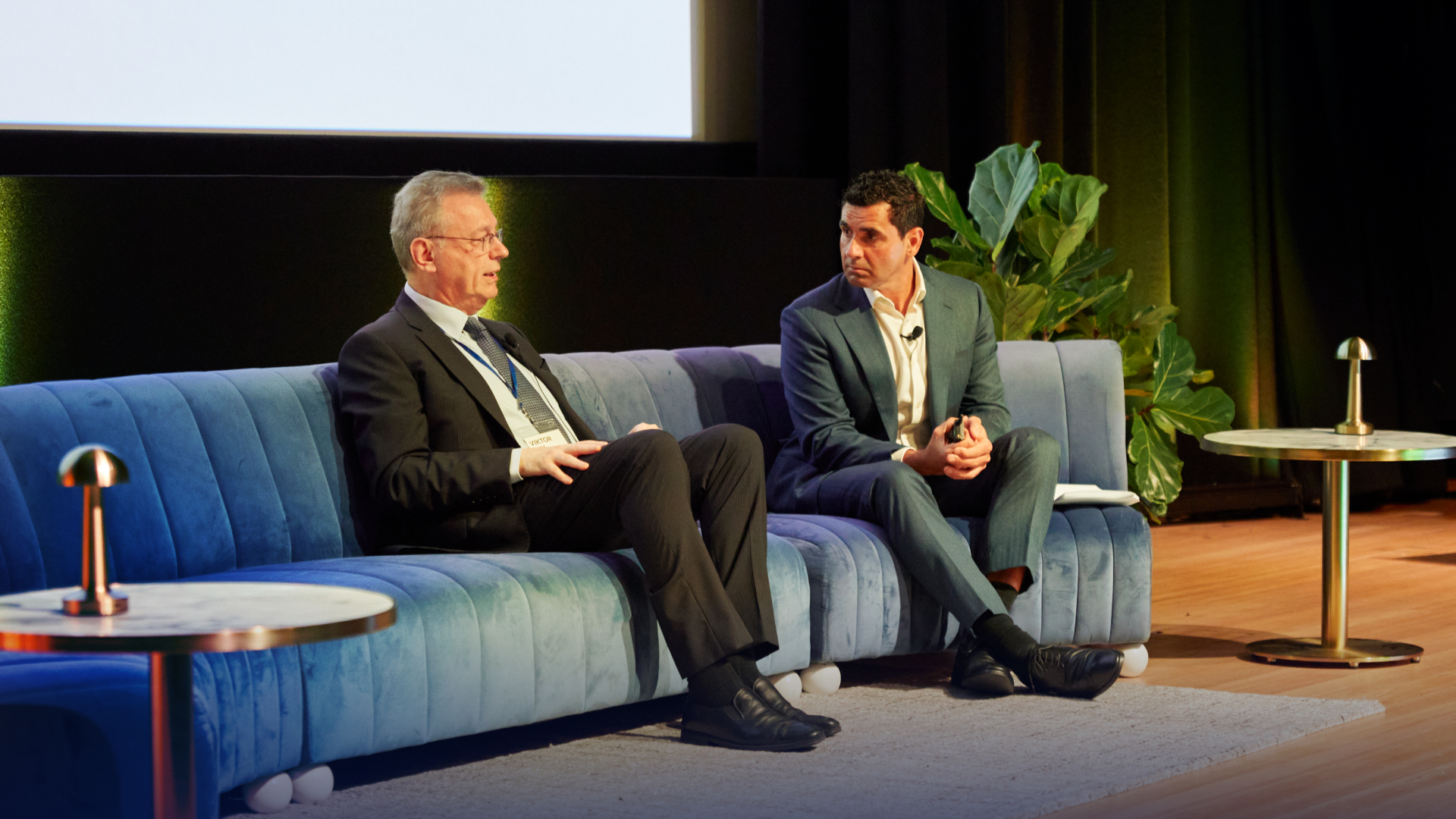“This time really is different”: Viktor Shvets’ dystopian investment roadmap
“Today is truly different, and our times are truly different. We will never go back to traditional investment thinking.”
As Viktor Shvets uttered those words in response to a simple question, the audience at the Art Gallery of New South Wales seemed to freeze - like figures in a canvas suddenly aware of their own impermanence.
The veteran strategist - Head of Global Desk Strategy at Macquarie Capital, author of The Great Rupture and The Twilight Before the Storm, and one of the most provocative thinkers in global markets - delivered an unnerving keynote at Livewire Live this morning.
Moderated by Livewire’s own James Marlay, the session titled How to embrace the chaos clouding markets was billed as a guide to making sense of uncertainty.
But Shvets didn’t offer comfort. He offered brutal predictions about the trajectory of the global economy and markets - possibilities most of us would prefer to leave unspoken rather than let linger in our minds.

The death of normal
Shvets’ central thesis was stark: “Today is truly different, and our times are truly different. We will never again go back to what we would’ve called classified as a conventional traditional thinking, traditional investment styles. None of this ever is going to come back.”
And if that sounds like exaggeration, consider this: when was the last time we endured a genuine, prolonged bear market? You’d have to go back to 2008. Since then, the ground rules have shifted dramatically:
Inequality is exploding. “If you think of wealth inequality, it's so high and it's progressing so quickly that I completely agree with the phrase that is being used quite frequently 'you are either [in the] 0.1% or you are a peasant'."
Business cycles are collapsing. “In the past it could take you 10, 15 years to create a large company. Today we can do it in 12 months.”
Moats are disappearing. “Warren Buffett liked to have moats. Those moats increasingly no longer exist. So you can actually pierce through those moats very quickly.”
Capital is overwhelming. “… the value of financial instruments are at least five times, one could argue 10 times larger than the real economy. The financial economy is the dog, the real economy is just the tail.”
Macro doesn’t work. “Yield curves don’t work the way they used to. Spreads don’t work the way they used to… the more the world changes, the less I do.”
He described this convergence as a kind of 'Fujiwhara effect' - a rare meteorological phenomenon where two hurricanes spiral around one another, often merging into a far more destructive storm.
For Shvets, that is today’s reality. Technology, finance, demographics, climate, and politics are no longer separate forces. They collide, amplify each other, and in doing so create rolling bubbles and permanent turbulence across markets and society.
The decimation of the labour force
The most chilling part of Shvets’ talk was about people themselves - including what future generations of children might end up doing.
AI, robotics, and automation are hollowing out employment. First it’s newsrooms and portfolio managers. Next it’s lawyers and bankers. But if you thought blue-collar work was safe, think again.
“We’re starting to overproduce plumbers and electricians. By the time they’re fully trained, there will probably be too many,” he warned.
And AI, he reminded the audience, is not confined to a single industry.
“It doesn’t alter one sector or two sectors - it alters almost everything. We already have autonomous driving. We already have self-healing pipes. You don’t need a plumber," he said.
His conclusion was blunt:
“As the information age cascades through our society, gradually there will be no jobs, there will be no occupations, there will be no progression, both blue collar and white collar.”
And when humans lose their utility? They turn to distraction - or anger. “If marginal utility of humans is declining, they will get angrier as time progresses,” he said.
Enter the “opium of the people,” a theme he touched on later in his presentation.
Forget mean reversion
For Shvets, one of the most dangerous illusions investors cling to is the idea of mean reversion. In his view, the very conditions that once made it possible – economic and capital market cycles – no longer exist. Without cycles, there is no “normal” to revert back to.
“The whole essence of eliminating economic and capital market cycles means there is no mean reversion… If they’re no longer, there is no mean reversion," he said.
He warned against comforting arguments that a company with good cash flow, dividends, and a solid balance sheet is “cheap” because it trades below its historical average. To Shvets, that’s a “loser argument.” What matters now is not stability, but speed and dominance.
Even today’s giants aren’t immune. The so-called Magnificent Seven, he suggested, may not look so magnificent in 12 to 18 months.
“Concentration of returns will remain high. All the winnings will flow to the winners, while losers get nothing," he said.
So how do you invest in this world?
Having painted a dystopian backdrop, Shvets didn’t leave investors empty-handed. He offered a stark framework for how to approach markets in a world where cycles are gone, moats are crumbling, and traditional strategies are useless.
Three investing approaches
Passive investing. “Fire your analysts, fire most of your portfolio managers, put technology in place, make sure that volatility is kept under control… Accumulate more and more assets,” he said. In his view, this is exactly why ETFs have ballooned.
Daily trading with no convictions. “Come in the morning with a blank sheet of paper. You have no convictions at all in anything," he said. He noted, however, that humans are too biased for this approach – machines are better suited.
Resilient portfolios. His preferred approach: build around long-term themes that will dominate the information age.
The core themes
Those themes are unflinching:
Bullets and prisons. “Social polarisation and wars are inevitable… you participate in providing governments with a means to affect the objectives, whether it’s wars, incarcerations or whatever that will be.”
Replacement and augmentation of humans. “We might not be human 10 or 20 years from now… it flows into artificial intelligence, robotics, automation, augmentation of biotech and infotech.”
Opium of the people. “If people are no longer useful… you need to distract them. Games, consoles, gambling, things like that.”
Government-directed capital. “Governments will be directing increasing flows of capital and investment as you go forward.”
Climate and commodities. “Climate change is real… the first area you see those themes evolving is commodities, but that’s also where excess supply occurs very quickly.”
Concentration of returns. “All the winnings go to the winner. Losers will get nothing… concentration of returns will stay high.”
Gold. “Gold is insurance. You pay insurance for your house, you pay insurance for your car. That’s all it is.”
Final thoughts
But Shvets did leave the audience with one sliver of good news. Because cycles are broken and capital is so abundant, investors are less likely to face the kind of devastating crashes that once wiped out portfolios.
“Don’t worry about Lehman Brothers moments or Minsky moments. We have so much capital available… regulators are proactive. Thursday something happens, by Monday morning it’s all fixed," he said.
That abundance of capital is a safety net - but it also means investors hoping for distressed fire sales will be left disappointed.
For Shvets, the trajectory is clear: disruption is not an episode, it is the condition of the age. And the disruption will only intensify.
“The information revolution will be three thousand times more disruptive than anything that came before.”
Check out other key moments from Livewire Live at our live blog:

4 topics


